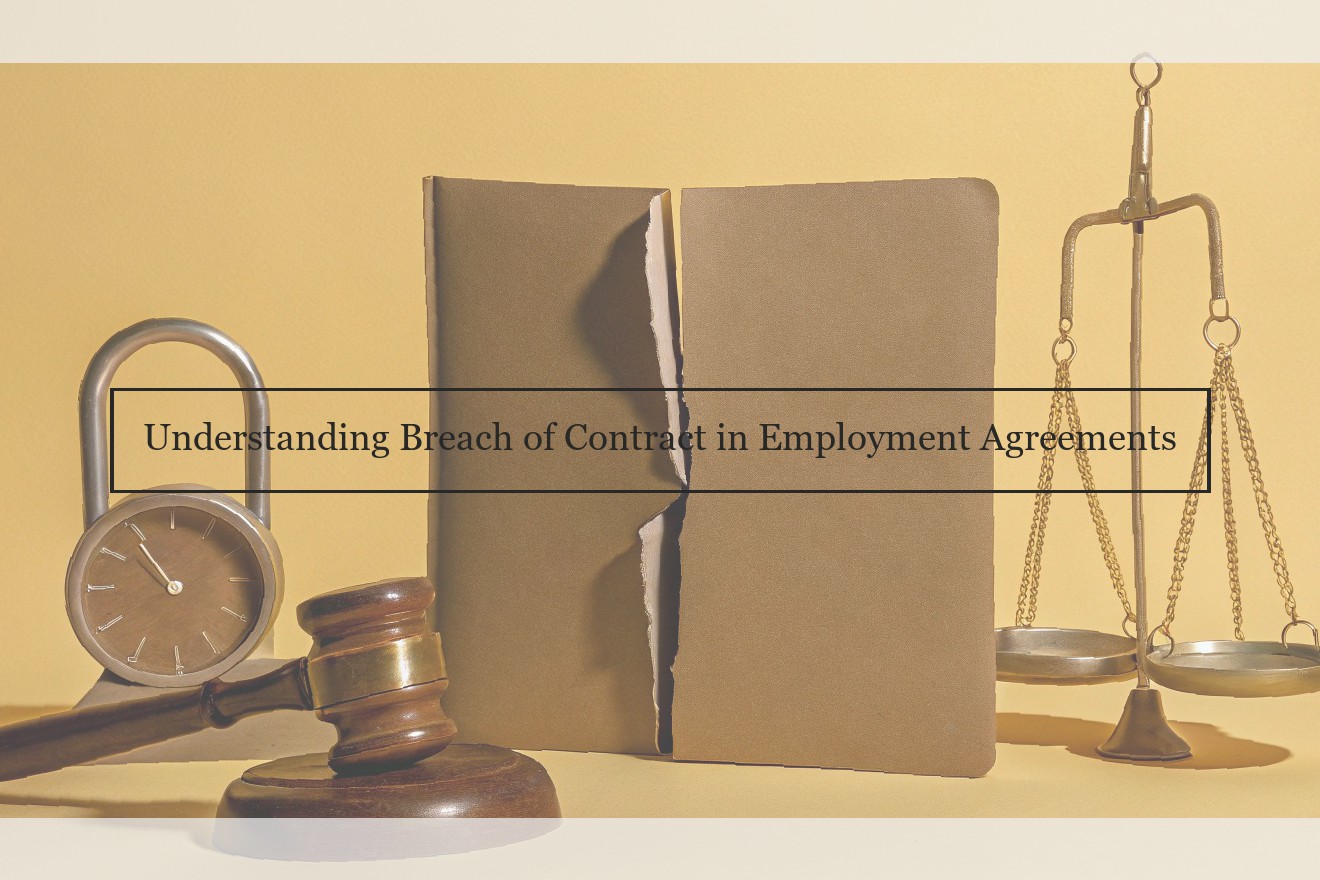What is a Breach of Contract?
The definition of a breach of contract is relatively straight forward. A breach of contract occurs when one party violates, oversteps, or fails to follow the terms of a contract with another party. This will occur even if the violation is done unintentionally and even if no damage or harm is incurred to the aggrieved party.
While this is true, the nuances of whether something rises to the level of being a breach of contract and what exactly is required to be proven in order to establish legal liability all depends upon the specific terms of the contract itself.
Taking the example of an employment agreement, was the employee supposed to work at the office all day every day? If so, and the employee works from home on Wednesday, then there will have been a breach of contract. Conversely, if the agreement included flexible working hours and the employee came into the office for only 5 minutes all week, then there may not have been a breach.
Contractual disputes in the context of employment agreements like the above are not unusual. They often arise because the employee and employer have different interpretations of the contract terms.
If the employment contract (whether oral, written, or implied) states that an employee will receive a pay increase after 6 months, it is generally considered a breach of contract if the employer does not follow through with the increase at that point . The legal remedy for breach of employment contract in this case would be the amount of the pay increase that should have been given. Importantly, damages in breach of contract claims are intended to put the aggrieved party in the position it would have been in had the employment contract been followed, but they cannot be used to punish the breaching party.
Because employment agreements are not always written or even enacted, the courts will often find that the employer’s expectations of the employee based on prior experience, the industry as a whole, and even the law, form the basis of an implied contract. This means that although the term of the actual contract itself may be unclear, the expectations for the employment relationship can still be determined to some extent. The employer who oversteps its bounds could therefore still be found liable for a breach.
Employment contracts are a type of contract like any other and violations of them must be dealt with in accordance with the breach of contract legal theory. Breach of contract employment lawsuits may be exactly what an employee needs to hold a negligent employer accountable and to recover compensation for unpaid wages or bonuses, inappropriate termination, or violations of non-competition or non-solicitation obligations. Even if the monetary damages awarded are not imposing, the same case may be used as the basis for injunctive relief, actual or punitive, on the part of the court to stop the employer from continuing to breach the contract.
Types of Breaches of Employment Contracts
Employees and employers may not understand the different types of breaches that can occur in an employment agreement. Determining whether a breach is material is not always clear, and determining the amount due to the employee if the breach is material may also be difficult. A minor breach is a failure by the breaching party to meet only the less important terms of the contract. With respect to the employment context, a minor breach consists of failing to provide the one agreed upon benefit to the other party, or failing to meet the timeframe in which to deliver the agreed upon benefits to the other party. A major breach, on the other hand, consists of a failure to comply with a term that the non-breaching party deem important enough to have the other party fulfill in the agreed upon timeframe. In the employment context, a major breach by an employer could consist of failing to pay the employee its hourly wage, or the employer failing to provide to the employee certain benefits.
There are some instances in which a breach may both be a minor breach and a major breach at the same time. With respect to an offered severance package, for example, if certain basic severance elements are offered but some basic severance aspects are missing, this could violate the labor law as a minor breach and constitute a major breach under the contract. Thus, if a minor breach is discovered, the aggrieved party may or may not be entitled to any compensation. In these cases, if the breach is deemed a material breach, then the aggrieved party is entitled to be released from further performance if the breach is non-curable within a reasonable time. On the other hand, if the breach is deemed a minor breach, the aggrieved party is still required to perform under the contract.
Common Reasons that Cause Breaches of Employment Agreements
There are many reasons that an employment contract is breached. Here are some of those reasons:
· A failure to pay the employee wages, including overtime compensation. This is often an issue in unpaid wage claims. Many times, an employee has been wrongfully terminated and not paid their final compensation due to an employer’s refusal to do so.
· Failing to comply with non-compete agreements. In most circumstances, if a non-compete agreement is in place, an employer can sue an employee for that employees failure to abide by the contract.
· Failing to uphold a confidentiality agreement.
· Breach of fiduciary duty. All employees have a fiduciary duty to their employer. A breach of fiduciary duty may include but is not limited to the improper disclosure of confidential information, divulging trade secrets, theft of physical property, and any other failure to act in good faith on behalf of the employer.
· Wrongful termination or withdrawal from the employment agreement.
· Failure to keep wage records. This is more properly an FLSA claim than a contract claim but it is still a violation of the employment agreement.
· Inconsistent salary payment. This occurs more with commission and sales employees.
· Discriminate against an employee in violation of employment agreement. While the greater issue here might be discrimination, this is still a violation of the employment agreement.
Legal Risks Associated with Breaching an Employment Agreement
When an employment agreement is breached, the consequences can be significant for both the employee and the employer. One of the known legal consequences of a breach of an employment agreement is a potential lawsuit for damages and any associated costs. If an employee voices an expectation of further employment or compensation, this expectation will become a contractual obligation with the employer. Courts require that employees document a written record of their communications with employers when an expectation of continued employment is made. These court proceedings vary from breach of contract claims to wrongful discharge claims.
A breach may involve a wrongful discharge based on your contract agreement, therefore , an employee may recover reinstatement and damages for emotional distress in addition to lost economic benefits of employment. An employee may be entitled to reinstatement rights if a third party employee violates the contract agreement. An employer may be required to pay the damages that resulted from the breach. Commercial enterprises that breach a contract with an employee might be ordered to bring their business practice up to the requirements of the employment agreement.
An employee might file a lawsuit and recover their actual damages, consequential damages, and punitive damages. Damages refer to the money required to perform what a party is contractually bound to do. Consequential damages include the actual damages plus an amount that is beyond common losses. Punitive damages are given when the breaking of a contract involves fraud, malice, oppression, or other motive. In cases where the employee is the breaching party, an employer may sue for lost profits or interfere with personal business relationships of the employee when they breach the contract.
What to do if you suspect a breach
If you suspect that your employer has breached an employment agreement or vice versa, it is important to take a few steps before hiring a lawyer. If you are the employee, you should ask your employer why it has not fulfilled its obligations under the agreement. If your employer refuses to answer your questions, you could risk not getting all of the money you are owed by filing a lawsuit and losing your right to negotiate for a settlement.
If you are the employer and you suspect that your employee has violated the terms of your employment agreement, you should consult your in-house attorney (if there is one) or an employment attorney before taking any action. Confronting your employee about the breach too early in the process can have unintended consequences and is why it is so important to consult with an employment lawyer about what your options are.
This step is when employees and employers documenting the breach is important so that they can support their claims if it proceeds to litigation. It may include electronic correspondence, paperwork, or verbal conversations discussing the breach. For example, when an employee goes against a non-compete agreement, documentation could include an email thread about what they are doing and their employment with a competitor.
Preventive steps to avoid a breach
In order to minimize the risk of a breach, both employers and employees should take steps to carefully review and understand the terms of their respective contracts and to express any questions or concerns openly. Regarding training and supervision, the standard in most cases is that an employer must give employees reasonable notice of changes to the terms of employment, provide reasonable training, and allow employees to ask questions and raise concerns.
An employer should include clear and precise language in the employment contract. The terms of the contract must be as detailed as possible and must make it clear what the employer expects of the employee. For example, an employer should be specific as to duties, responsibilities, and expected hours of work. Furthermore, the employer’s expectations should be consistent across all levels of the organization. Samuel Matz , a well-known human resources consultant, recommends the use of training manuals and similar tools as another way to avoid a breach by making the contract’s terms explicit.
Likewise, employees should review their contract carefully before signing to ensure that it reflects the terms that they agreed to with the employer. Having an attorney review a contract before signing can help an employee discover any overly restrictive or unnecessary non-compete provisions. Employees should also avoid ambiguities by seeking clarification on anything that they do not understand or did not agree to. In the alternative, employees can request changes to the contract as a condition of accepting the position, which the employer may or may not agree to.
Finally, if there is a change in any of the terms after employment begins, employers should ensure that the employee is properly notified and agrees to the change, in writing.




+ There are no comments
Add yours